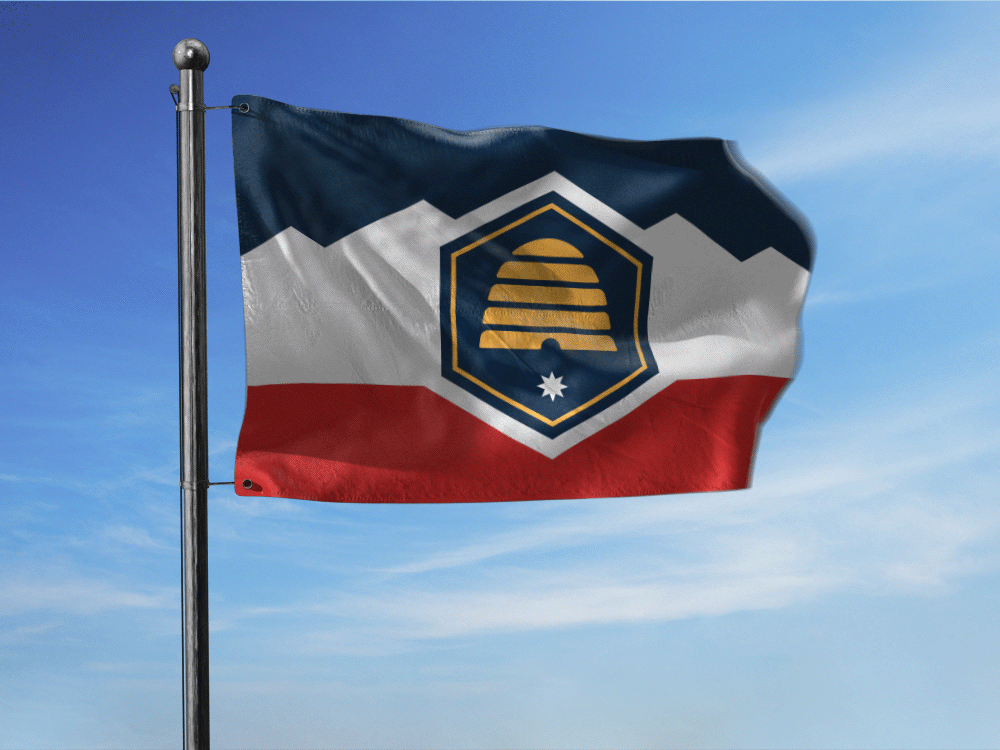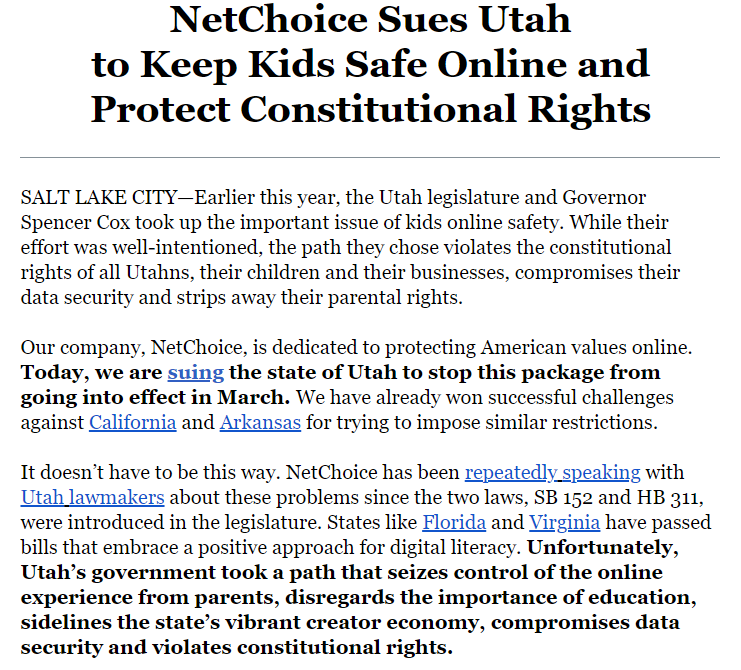mvario: "Utah Finally Sued Over Its Obv…" - Mastodon
Utah Finally Sued Over Its Obviously Unconstitutional Social Media ‘But Think Of The Kids!’ Law
Utah Finally Sued Over Its Obviously
Unconstitutional Social
Media ‘But Think Of The Kids!’ Law
from the but-why-won't-you-think-of-the-children dept
And then… nothing. Oddly, while many of us expected a lawsuit, none appeared. Lawsuits had been filed to block other laws, such as those in Texas, Florida, California, Arkansas, New York, and more… but nothing about the Utah bill, which was one of the most high profile. A few months ago I even started a blog post asking why no one had sued Utah yet, but never got around to finishing it. A few weeks back there was a report that once Utah’s legislature goes back into session in early 2024, that the sponsor of the bill, state Senator Mike McKell, would be offering amendments to the law, because he knows it’s unconstitutional, and he was trying to “inoculate” the bill from the inevitable lawsuit.
And, then, finally, last week NetChoice (which has filed many of the other challenges to state bills) announced that it had finally sued Utah over the bill. . .
- Other issues with the bill, like those in other states, is the effective requirement to age verify all visitors, which multiple courts have noted is, by itself, a clear 1st Amendment violation (not to mention a privacy problem).
- Also, its prohibition on showing “personalized” content to kids is ridiculous on multiple levels, including that if you can’t personalize content to kids, then… um… how do you remove content that is inappropriate for children from their feeds?
- But, thankfully, NetChoice has finally stepped up to challenge this law.
- Meanwhile, NetChoice moved almost immediately for a preliminary injunction blocking the law from going into effect.
- As the motion makes clear, moral panics happen with all sorts of new media, and that doesn’t make it okay to limit access to those new forms of communication:
New mediums of expression continually emerge, evolve, and reinvent the ways that we speak and engage. Yet governments too often try to regulate those new mediums, fearing that widespread adoption may be harmful. A common refrain among lawmakers is that the nature of a new technology requires limiting minors’ access to the protected speech, ideas, and content available via these mediums because new channels of expression may endanger or harm our youth
The Supreme Court has consistently rejected State control of the mediums minors use to access speech—such as “dime novels,” “[r]adio dramas,” “movies,” “comic books,” “television,” “music lyrics,” or “video games”—as contrary to the First Amendment. Brown v. Ent. Merchs. Ass’n, 564 U.S. 786, 797-98 (2011). Moreover, the Supreme Court has made clear that minors “are entitled to a significant measure of First Amendment protection” and that the State lacks “a free floating power to restrict the ideas to which children may be exposed.” Id. at 794 (cleaned up). Those protections apply with particular force when laws impeding minors’ access to speech may also affect adults’ access to speech. See Ashcroft v. ACLU, 542 U.S. 656, 667 (2004); Reno v. ACLU, 521 U.S. 844, 882 (1997); NetChoice, LLC v. Bonta, 2023 WL 6135551, at 13 (N.D. Cal. Sept. 18, 2023); NetChoice, LLC v. Griffin, 2023 WL 5660155, at 21 (W.D. Ark. Aug. 31, 2023).
The Utah Social Media Regulation Act should likewise be rejected as an unconstitutional attempt to regulate minors’ ability to access, speak, hear, share, and otherwise engage in protected speech. Social media websites allow minors and adults alike to “engage in a wide array of protected First Amendment activity on topics as diverse as human thought.” Griffin, 2023 WL 5660155, at *5 (cleaned up). 1 Yet the Act requires a content-, viewpoint-, and speaker-based subset of covered websites to, among other things: verify all users’ ages, obtain parental consent before allowing minors to hold accounts, obtain information about minors’ and parents’ identities, and block minors’ access to these websites during a 10:30 p.m. to 6:30 a.m. curfew. §§ 13-63-102, -105. 2 But the Act exempts dozens of categories of comparable websites that disseminate the same or similar speech. The Act’s bans and restrictions also impede adults’ ability to access and engage in protected speech on covered websites. Decades of First Amendment precedent prohibit all of this.
Hopefully this will be quickly granted — the looming March deadline when the law goes into effect creates some element of time pressure — but like all these laws, I assume there will be a long appeals process as well.
SALT LAKE CITY—Earlier this year, the Utah legislature and Governor Spencer Cox took up the important issue of kids online safety. While their effort was well-intentioned, the path they chose violates the constitutional rights of all Utahns, their children and their businesses, compromises their data security and strips away their parental rights.
Our company, NetChoice, is dedicated to protecting American values online. Today, we are suing the state of Utah to stop this package from going into effect in March. We have already won successful challenges against California and Arkansas for trying to impose similar restrictions.
It doesn’t have to be this way. NetChoice has been repeatedly speaking with Utah lawmakers about these problems since the two laws, SB 152 and HB 311, were introduced in the legislature. States like Florida and Virginia have passed bills that embrace a positive approach for digital literacy. Unfortunately, Utah’s government took a path that seizes control of the online experience from parents, disregards the importance of education, sidelines the state’s vibrant creator economy, compromises data security and violates constitutional rights.
“NetChoice believes that families equipped with educational resources are capable of determining the best approach to online services and privacy protections for themselves. With NetChoice v. Reyes, we are fighting to ensure that all Utahns can embrace digital tools without the forceful clutch of government control,” said Chris Marchese, Director of the NetChoice Litigation Center. “Now that these tools are prominent in our lives and important for our economy, young people should learn how to harness their power while developing healthy and safe habits.”
Utahns do not have to choose between their constitutional rights, parental rights, cybersecurity, kids’ safety or economic engine. With NetChoice v. Reyes, we will fight to ensure that Utah’s Invasion of Privacy Acts are halted. NetChoice looks forward to seeing the State in court.
You can find our filing HERE and case resources for NetChoice v. Reyes HERE.
Read the exclusive on our lawsuit in The Salt Lake Tribune.
Please contact Krista Chavez at press@netchoice.org with inquiries.
About NetChoice v. Reyes
- Utahns are capable of mastering the digital experience for themselves and their families. But many are simply unaware of the wide variety of tools available to them to protect their safety online. They don’t need big government to force them to compromise their security.
- NetChoice is suing the state of Utah to:
- (1) ensure constitutional protections are upheld online;
- (2) protect the safety and security of all Utahns—especially children, and;
- (2) keep parents in charge of their families—not big government.
- We’re asking the U.S. District Court for the District of Utah—Salt Lake Division to halt SB 152 and HB 311 from going into effect while our case, NetChoice v. Reyes, moves through the legal system. These laws violate various parts of the U.S. Constitution:
- The First Amendment: Conditioning Utahns’ First Amendment right to share and receive information online on their willingness to hand over their most sensitive, personal data to third-party age-verification companies.
- The Supremacy Clause: Disregarding existing federal law that ensures frivolous lawsuits aren’t weaponized to curtail free speech.
- These Invasion of Privacy Acts seriously harm Utahns in additional ways, such as:
- Compromising their data security;
- Taking away their rights to run their families as they deem appropriate; and
- Undermining the state’s vibrant innovation economy.
NetChoice is fighting to protect free expression and free enterprise online in Utah and across America.
Related
___________________________________________________________________________________










No comments:
Post a Comment